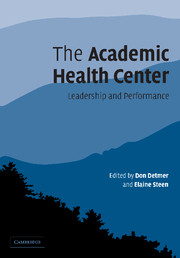Book contents
- Frontmatter
- Contents
- List of figures
- List of tables
- Foreword
- Acknowledgments
- List of contributors
- Introduction
- 1 Academic health centers: current status, future challenges
- 2 A health system for the twenty-first century
- 3 Stronger leadership in and by academic health centers
- 4 Pursuing organizational and cultural change
- 5 Managing and leveraging organizational knowledge
- 6 e-Health challenges and opportunities
- 7 Organizational challenges facing the European academic health center
- Index
- References
4 - Pursuing organizational and cultural change
Published online by Cambridge University Press: 12 November 2009
- Frontmatter
- Contents
- List of figures
- List of tables
- Foreword
- Acknowledgments
- List of contributors
- Introduction
- 1 Academic health centers: current status, future challenges
- 2 A health system for the twenty-first century
- 3 Stronger leadership in and by academic health centers
- 4 Pursuing organizational and cultural change
- 5 Managing and leveraging organizational knowledge
- 6 e-Health challenges and opportunities
- 7 Organizational challenges facing the European academic health center
- Index
- References
Summary
Introduction
The academic physician, academic medicine, and the health professions in general are in the midst of an extended period of organizational and professional turbulence. Beginning with the explosive growth of managed care in the 1980s, the relatively closed, professionally self-regulated health services sector has been pushed into a more classically competitive marketplace. The 1990s brought additional impetus for change with shifting public policy, changing demographics, increasing consumerism, and the growing influence of information technologies. Further, the turn of the century brought renewed public concern with deficiencies and inconsistencies in the quality of health care services.
The health care sector is clearly laboring under the strains of this changing and demanding environment. The new marketplace is squeezing the financial resources and compensation available to health professionals and organizations. Societal needs, expectations, and aspirations for the health care system have changed and are growing. Academic health centers (AHCs), in particular, continue to face great challenges in adapting their multiple service and academic missions to changing societal, financial, and service requirements.
Academic health centers have adopted measures to improve service, cut costs, and increase productivity. They are learning how to do more with less. They have also worked to develop new capabilities and revenue streams in an attempt to shore-up strained academic and clinical resources. These efforts increase the service and performance expectations for faculty and staff who find it increasingly difficult to pursue research and teaching goals.
- Type
- Chapter
- Information
- The Academic Health CenterLeadership and Performance, pp. 119 - 187Publisher: Cambridge University PressPrint publication year: 2005

